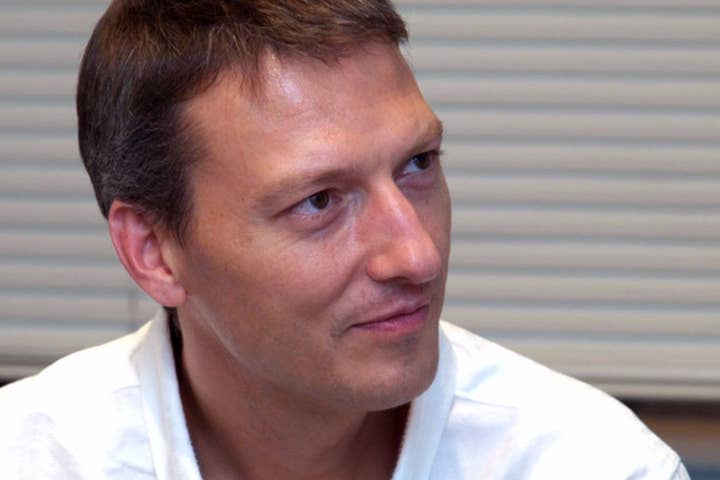"I feel perfectly confident that the right people will take over"
Quantic Dream's Guillaume De Fondaumiere on retirement from the EGDF
As anyone who's ever tried to arrange anything involving more than about three people will understand, organising consensus is no easy task. Getting a group of friends to all be at the same pub at the same time is hard enough, but trying to get 600 studios employing 17,000 people across nine different countries is something else. Up until last month, when he announced that he'd be stepping down, that was Guillaume De Fondaumiere's unenviable task as the president of the European Game Developer Federation: pulling together the best interests of studios across one of the world's most culturally diverse regions in order to provide a better foundation for the success of them all.
His tenure, having been elected to the position twice, has been a tremendously successful one, with achievements ranging from tax credits to legally enforceable PEGI ratings, but it's been a long and arduous journey. Now, he leaves the organisation with great high hopes and a bright future, and he's certain that it's in safe hands. He just doesn't know whose.
"When we started out with the EGDF we had six or seven members," he tells me over coffee at Reboot Develop, a few days after the announcement of his stepping down. "That's already a lot, especially when you have members from Finland, Spain, UK, France, Germany... We're now around 25, but that was already pretty representative of the diversity of views and cultures in Europe. What we did well right from the beginning was to define who we were and what we were doing. We were an organisation representing the interests of developers and our first objective was to obtain cultural recognition, then to establish measures which put us on a level playing field with places like Canada. That sounds obvious today, but at that point it wasn't obvious at all. At one point we even had members leaving because they didn't agree with that simple mission statement.
" It's very important to be clear about who you are, and to seek the approval of everyone whenever you add something. That takes time, it moves slowly, but it's very important."
"But it was very important not to compromise those ideals. So we told them that if they didn't adhere to those core principles, they should leave. They did, but they've actually come back since. I'm happy about that. It's very important to be clear about who you are, and to seek the approval of everyone whenever you add something. That takes time, it moves slowly, but it's very important."
Managing such a vast, complex and sometimes glacial entity comes with numerous challenges, but it's not too distant from the day to day running of any large company. De Foundaumiere's experience of running his own firms, and his current job as the co-CEO of Quantic Dream with David Cage, has certainly readied him for the task, so will he be looking for someone with a similar background to step into his shoes?
"I wasn't the CEO of a big company when I started," he laughs. "It's like a first job, you have to learn. To learn you have to make your own experience. Will there be mistakes? Certainly. Will it be a little chaotic at the beginning? Probably. But you need to get through that learning experience. What was important for me was to find the people with that potential. All these people who have launched studios have had the guts to create something. They've got the inclination to lead, to organise. I feel perfectly confident that the right people will rise to take over."
Whoever De Fondaumiere does end up handing over to, they're probably going to have an easier task on their hands than he did, thanks in no small part to the hard work he's done over the years. In addition, though, there's the relatively new found sense of collaborative spirit which has infused the industry, an attitude of knowledge sharing and collective problem solving which has partly arisen from the accessibility of the industry's shared tools and the proliferation of events, but also thanks to the less protective stances of the indies which have led so much of gaming's creative revitalisation.
"I'm particularly hopeful that the EGDF will be able to grow even more quickly that it did previously: there's a younger generation with a more conscious understanding of the need to work together"
"Absolutely," he says when I ask him if the shift toward smaller companies has helped this grow. "This is why I'm particularly hopeful that the EGDF will be able to grow even more quickly that it did previously: there's a younger generation with a more conscious understanding of the need to work together. That's why I was speaking about co-productions - I think we're going to see that more and more. I come from a generation where we needed to do things on our own, to own it. We were more distrustful of others. I think that this new generation is much more positive. It's one of the reasons I decided to resign - I want this new generation to rise and take control. That's utterly important. I've launched this, now other people need to come and make it their own. If I don't step down, there'll never be that space.
"I'm doing the same in France, I'm going to resign at the end of the year. I'm working with this young generation in France, I've given them vice presidencies to make them more responsible. I'm very, very proud of them. I don't know who will take over, but I know they'll be very capable."
Chatting about all of this co-operation and the coming together of the industry's creative elite puts me in mind of a quotation from Civilisation IV, read with deadpan taciturnity by the late, great Leonard Nimoy. It's actually the words of the economist Adam Smith, but pretty much every historical reference I have is refracted through the prism of Civ. It reads: "People of the same trade seldom meet together even for merriment and diversion but the conversation ends at a conspiracy against the public."
"There'll always be people who aren't satisfied with what you're doing. I think if we're honest and clear about what we're doing, if we try hard and don't make promises we can't keep, there's no reason we can't be successful"
Given the events of the past months, when a significant and vocal section of the game-playing public seemingly became convinced that developers, press and 'cultural Marxists' were conspiring to destroy their hobby from the inside, is there any reason to believe that this collectivism is something to be concerned about?
"I don't think so! There'll always be people who aren't satisfied with what you're doing. I think if we're honest and clear about what we're doing, if we try hard and don't make promises we can't keep, there's no reason we can't be successful. We've proven that as an industry many times in recent years: child protection, age classification. We've been able to remain independent and show a sense of maturity.
"The same with Tax Credits - another success. Trust me, when I started to talk about Tax Credits 15 years ago, everyone was very sceptical - everyone was telling we we'd never get the green light from government, that we'd never get it past the EU. Today, two of the most prolific game making countries in Europe have introduced Tax Credits which work well. Everyone can see that they have a positive impact. We're successful when we work together as an industry and I'm positive that we can continue to work to the benefit of the industry at a local trade body level as well as at EGDF level."
Our conversation turns to current challenges, specifically the recent rash of VAT changes which has left many SMEs operating in digital marketplaces scratching their heads. Guillaume assures me it's firmly on the agenda.
"We're working closely with ISFE and some of the bigger players like Google to influence the European Commission as much as possible and make sure that the ecosystem enables us to work the way we do, to experience new business models and provide a better service for customers. These new regulations are another good reason for us to organise themselves. Join organisations, pay membership fees, defend your interests.
"We certainly shouldn't just sit back in our corners and wait to be eaten by the wolves, we need to do something about it."
"We're going to face a great number of challenges on this front over the next few years. On VAT, consumer protection, copyright - these are all factors that can dramatically affect the way that we do business. We certainly shouldn't just sit back in our corners and wait to be eaten by the wolves, we need to do something about it. I know it's difficult for studios to understand that these issues might affect them in the future and put money on the table, but it's incredibly important."
One of those potential challenges, at least for businesses on this side of the Channel, is the potential that, within the next couple of years, Britain might find itself in a significantly different position with regards to the rest of Europe. With the Tory government established, a referendum on EU membership is not far away. Should the public decide that it's time to leave, does De Fondaumiere see problems arising for UK firms?
"It's certainly going to have an impact," he says, emphatically. "There'll be tensions on the Pound, which might be positive or not. There might be some trade restrictions... I hope not. I think Barack Obama recently said that the UK's place was within Europe, that it would be a historical mistake to leave. If your closest ally is of that opinion, I think you're wise to listen. There'd be a huge amount of destructive practical issues, I really hope it doesn't happen. I guess the good thing about politicians is that they don't always keep their promises!"









